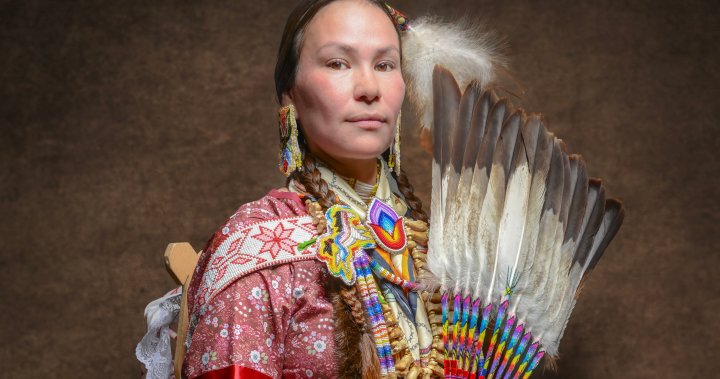In honor of Mother’s Day, two Indigenous women who are powwow dancers are reflecting on their roles as mothers and how they are reclaiming their Indigeneity by bringing back a traditional tool that symbolizes motherhood. Marrisa Moccasin-Mitsuing, a proud mother of five from the Saulteaux First Nation, has embraced her role as a mother by adopting the use of a cradleboard, a traditional baby carrier used by many Indigenous tribes historically and still to this day. During the pandemic, as Moccasin-Mitsuing was adjusting to living in temporary isolation, she wanted to learn more about her upbringing, especially in light of the discoveries of unmarked graves at residential schools. This curiosity led her to explore the use of cradleboards by Indigenous women in old photos before the impact of residential schools.
Inspired by the traditional use of cradleboards by Indigenous women and wanting to honor her parents who were impacted by residential schools, Moccasin-Mitsuing conducted her first powwow dance at Sweetgrass First Nation last year while carrying her son in a cradleboard. Despite facing criticism and negative comments on social media, she remained committed to honoring her heritage and her role as a mother. Gina Daniels, a powwow dancer from Cowessess First Nation, also expressed understanding of the mixed feelings surrounding carrying children during celebrations like powwows, noting that some territories have protocols against it. However, Daniels admired Moccasin-Mitsuing’s courage and participated in a ‘Cradleboard Special’ at a powwow to show her support and respect for Moccasin-Mitsuing and her family.
Despite the controversy surrounding her dance style, Moccasin-Mitsuing plans to continue dancing with her cradleboard as a way to signify her role as a mother and to bring back a piece of Indigenous tradition. She sees tools like the cradleboard as important elements that Indigenous communities are reclaiming and reintroducing. Her journey in motherhood is about being the best relative she can be and embodying the essence of a powerful nêhiyaw (Cree person). As she navigates her identity as a mother and a powwow dancer, Moccasin-Mitsuing is determined to honor her heritage and show resilience in the face of criticism and challenges.
The use of cradleboards by Indigenous women holds deep cultural significance and serves as a meaningful connection to ancestral traditions. It represents the importance of mothers and their integral role within Indigenous communities. Moccasin-Mitsuing’s decision to incorporate the cradleboard into her powwow dances is a way of reclaiming and revitalizing this tradition, while also paying homage to the strength and resilience of Indigenous mothers throughout history. By honoring her heritage and embracing her role as a mother through her dance, Moccasin-Mitsuing is contributing to the preservation and celebration of Indigenous culture and traditions. Her actions serve as a reminder of the endurance and perseverance of Indigenous communities in the face of adversity and the ongoing journey of healing and reclaiming their identities.













